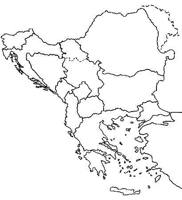
|
The Society of Folk Dance Historians (SFDH)
Balkan Religions
[
Home |
About |
Encyclopedia |
Periodicals | CLICK AN IMAGE TO ENLARGE |

|
 As a legacy of Byzantium from the east and Rome from the west, the pre-Ottoman Balkan Peninsula worshipped in the Orthodox tradition, and to a smaller extent, the Catholic. This Christian matrix overlay a still-evident fertility cult and defied the application of boundaries with the addition of Romani and Sephardic Jewish communities.
As a legacy of Byzantium from the east and Rome from the west, the pre-Ottoman Balkan Peninsula worshipped in the Orthodox tradition, and to a smaller extent, the Catholic. This Christian matrix overlay a still-evident fertility cult and defied the application of boundaries with the addition of Romani and Sephardic Jewish communities.
Foreign overlords further confused the picture. Centuries of Ottoman-mandated forced conversion to Islam and immigration of Islamic colonists created an impossible patchwork of religious beliefs and ethnic hatreds as the elite classes used religion as an excuse to tax and steal. Bulgarian Orthodox clergy today, however, will tell you that 45 years of Soviet rule destroyed more of Bulgaria's religious heritage than 500 years of Ottoman rule due to Soviet efficiency and high explosives.
As in Armenia and Poland, religion kept Balkan nationalities alive through periods of foreign domination. Bulgarians, for example, withstood Ottoman taxation of non-Moslems, including not only money, produce, and livestock, but also the Devshirme, the Blood Tax, the seizing of young sons to fight in the Sultan's Janissary Corps. Bulgarians who converted to Islam became, in law and in society, Turks. For a more recent example, consider the former Yugoslavia as it fragmented. Catholics were equated with Croatia and Slovenia, Orthodox were equated with Serbia, and Moslems were equated with Bosnia. Religion equaled nationality. Religious minorities in any community became foreigners, unprotected by law, and subject to the worst atrocities.
As I was growing up in 1950s Texas, the 1860-1865 American Civil War remained very much an issue of state pride and patriotism. In early 20th century Scotland, the 1692 Massacre of Glencoe remained alive in the memories of elderly MacDonalds. The Ottoman defeat at Shipka occurred in 1876, eleven years after the end of the Civil War and 184 years after Glencoe. Only the most myopic would honestly dismiss today's Balkan popular memory as government-inspired propaganda. Do not underestimate the power of religion in the Balkans.
DOCUMENTS
- Balkans, a region.
- Ron Houston, an article.
This page © 2018 by Ron Houston.
Please do not copy any part of this page without including this copyright notice.
Please do not copy small portions out of context.
Please do not copy large portions without permission from Ron Houston.